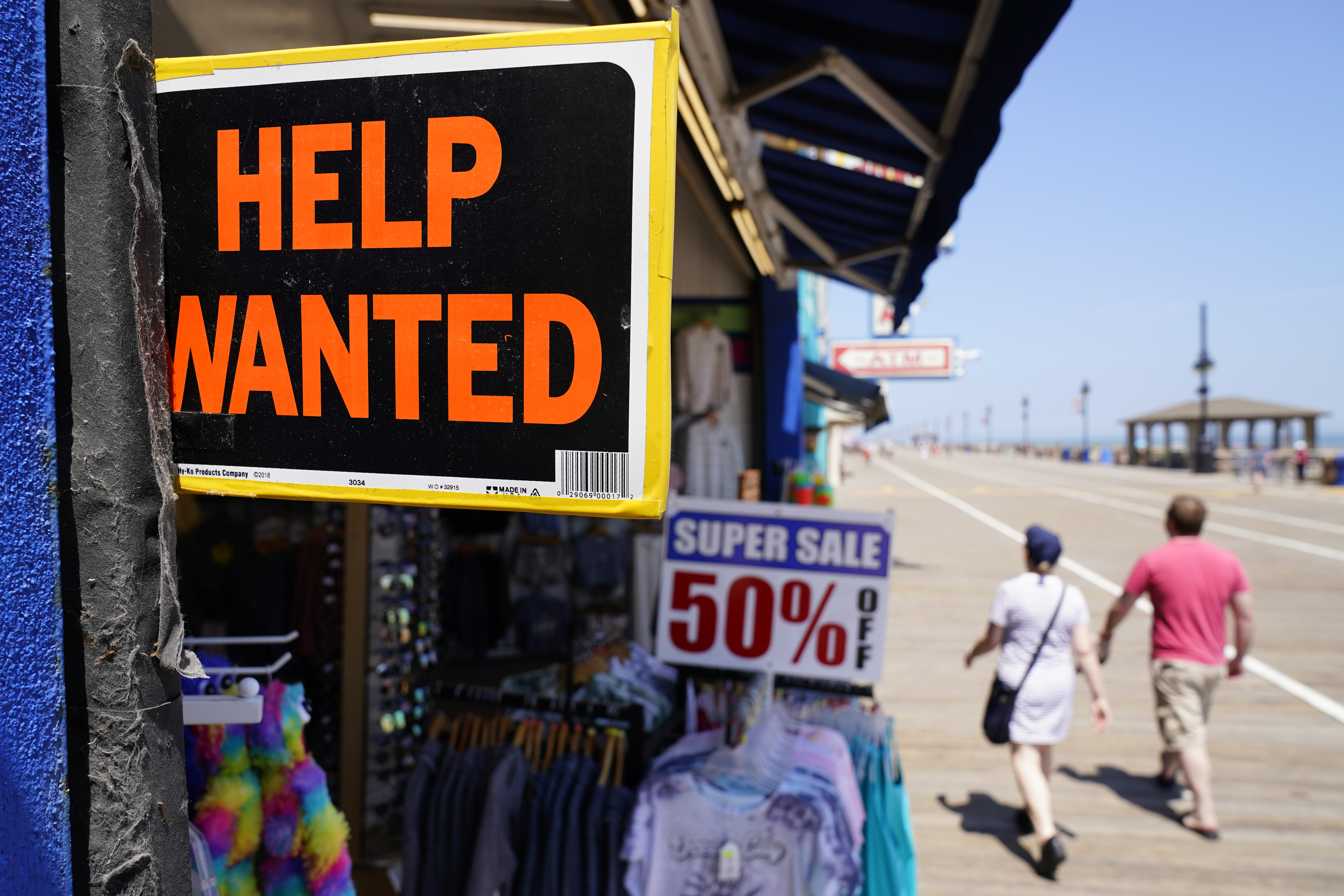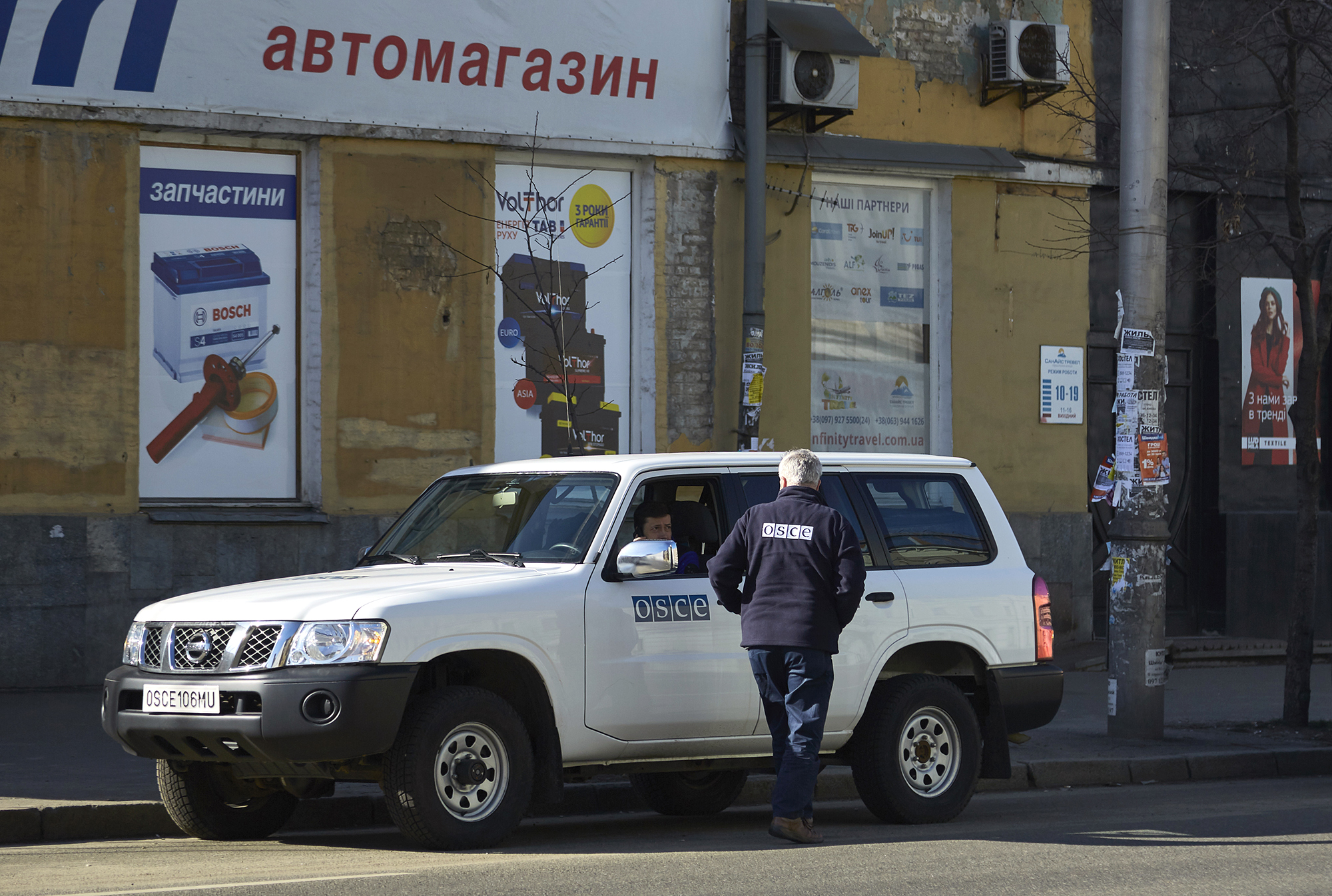 | BY BEN WHITE | Presented by the American Health Care Association and National Center for Assisted Living | With help from Tyler Weyant
| 
People walk past a help wanted sign in front of a souvenir shop along the boardwalk, Thursday, June 2, 2022, in Ocean City, N.J. | Matt Slocum/AP Photo | INFLATION IS REALLY … BRINGING ME OVER, MAN — My colleague Victoria Guida tweeted something very smart today. When the latest dismal inflation numbers hit, she said: “Inflation is really bad, but this is still strange. We are in a recession in vibe only. The Fed targets vibes for a reason, though. Expectations matter in economic behavior.” The tweet perfectly captured this bizarre economic moment. By the usual numbers — unemployment, job openings, consumer demand and the like — the U.S. economy is red hot, with few signs of impending recession. There are still something close to two jobs open for every person seeking work. Consumers keep pouring out cash, much of it saved during the pandemic. And now they aren’t just doing it on stuff that gets delivered to your door. Restaurant and bar spending is way up. People are flying more and staying in hotels. The party — it would seem — is seriously thumping. Wages are rising around 5 percent annually. But if it’s so hot, why does everyone hate this economy? And I mean everyone. The University of Michigan’s latest consumer sentiment gauge crashed to a record low 50.2, down from 58.4 in May. Polls on Americans’ views on the economy make it look like we are in a Great Depression. Americans are sour not just on the current economy but also on prospects for the future. The main reason, of course, is our morbidly obese inflation rate. Prices soared 8.6 percent on an annual basis in May and rose 1 percent from April. That is quite terrible. Especially grizzly: the month-to-month bit demonstrating we have not — as so many hoped — hit “peak” inflation. Gas and food prices continue to explode higher, with pump prices hovering at nearly $5 per gallon. Those wage gains we discussed are all swallowed up, and then some, by inflation. And Americans don’t think anyone has a clue what to do to arrest the rise in prices. At the same time, we all still have Covid-era hangovers and get hammered by horrible news all the time, from gun violence to European wars to replays of the Jan. 6 attack on the U.S. Capitol. The vibes, man, are not groovy. And those unmellow vibes themselves could help trigger recession, bringing us back to Victoria’s point about the Fed watching sentiment measures so closely. This many people feeling this glum (while seeing Covid relief money vanish) can slam the brakes on consumer spending, which is pretty much the whole economy. (OK, 70 percent.) The most vexing problem is that the Fed can’t worry that much about the bad vibes at the moment — because it has to bring down the inflation causing those vibes. And that means lots of interest hikes. If those hikes intersect with consumers starting to shut their wallets anyway, more than the vibes will be bad. Welcome to POLITICO Nightly. Reach out with news, tips and ideas at nightly@politico.com. Or contact tonight’s author at bwhite@politico.com or on Twitter at @morningmoneyben.
| |
| | A message from the American Health Care Association and National Center for Assisted Living: Congress: Invest in frontline care workers who protect America’s seniors.
saveourseniors.org/ | | | | | — Pence team couldn’t verify Trump campaign’s election fraud claims: In the days before the electoral college certification, then-Vice President Mike Pence’s legal team laid out that they found most of the Trump campaign’s assertions of election fraud minor or unverifiable, according to a previously unseen memo obtained by POLITICO. The National Archives and Records Administration provided the memo to the select committee, according to a person familiar with the document. — U.S. ditches negative Covid test for international visitors: The Biden administration said today it will lift pre-departure testing requirements for all travelers coming into the United States from overseas, removing as of midnight on Sunday one of the last Covid-19 travel restrictions still in place in America. — Illinois man allegedly attempted to firebomb Chinese embassy: Shortly after 7 a.m. on Thursday, a Secret Service officer was standing outside the embassy on International Place NW when a man approached the building, holding a glass beer bottle stuffed with a black cloth that he allegedly attempted to ignite, according to an affidavit from the Bureau of Alcohol, Tobacco, Firearms and Explosives. — Globalization’s gut check: The future of globalization faces a major test as the World Trade Organization kicks off its first big decision-making meeting in five years in Geneva on Sunday. The immediate issues on the table involve Covid-19 vaccine patents, environmentally harmful fishing subsidies and global food security concerns heightened by Russia’s war in Ukraine. But the bigger question looming over the gathering is whether the WTO can still forge international cooperation at a time when multiple crises and increasing frictions between the United States and China are upending the world order.
| |
| | DON'T MISS DIGITAL FUTURE DAILY - OUR TECHNOLOGY NEWSLETTER, RE-IMAGINED: Technology is always evolving, and our new tech-obsessed newsletter is too! Digital Future Daily unlocks the most important stories determining the future of technology, from Washington to Silicon Valley and innovation power centers around the world. Readers get an in-depth look at how the next wave of tech will reshape civic and political life, including activism, fundraising, lobbying and legislating. Go inside the minds of the biggest tech players, policymakers and regulators to learn how their decisions affect our lives. Don't miss out, subscribe today. | | | | | | | | 
An OSCE vehicle is part of a convoy on Feb. 26, 2022, in Kyiv, Ukraine. | Pierre Crom/Getty Images | LEFT BEHIND — For eight years, the Organization for Security Cooperation in Europe, the world’s largest security body, had overseen a Special Monitoring Mission on the ground in Ukraine, whose task it was to observe the war and tally cease-fire violations in the country’s eastern regions and its impact beyond. But when Russian missiles came raining down and tanks began streaming across the Ukrainian border on Feb. 24, it had no plan in place to react to an assault on the scale that Russia had launched, write Christopher Miller and Stephanie Liechtenstein. OSCE officials inside its Vienna headquarters scrambled to figure out what to do with its 966 international monitors and local staff members spread across Ukraine’s 24 regions and the areas of Donetsk and Luhansk under the control of Russia and its separatist proxies. OSCE Secretary General Helga Schmid gave an order in Vienna on the evening of Feb. 24 to evacuate international staff from Ukraine and instructed her chief monitor there to “facilitate the relocation of national mission members within the country where possible and if requested,” according to a statement delivered by Schmid to a special meeting of the OSCE Permanent Council in Vienna on Feb. 27. But for the hundreds of Ukrainian OSCE staffers, relocation wasn’t an option — and even communication was in short supply. An email provided by a Ukrainian SMM staffer to POLITICO that was sent by Almir Mehanovic, the Donetsk unit’s deputy team leader, at 10:40 p.m. local time on Feb. 25, indicates the Ukrainians had expressed their worries to the OSCE. But a POLITICO examination of the OSCE’s activities in the days and weeks leading up to the invasion and immediately afterward found that local staffers never did get answers, or at least the ones they needed. Instead, there was internal resistance to prior evacuation planning, a lack of an up-to-date plan at the time of the attack, breakdowns in communication, and rules that limit which staff members could be evacuated that put 478 Ukrainian staffers and their families in vulnerable and dangerous situations. That chaos also led to the abandonment of 43 bulletproof Toyota and Nissan vehicles in Russia, and saw sensitive data compromised and fall into Russian hands. For at least one former staffer, it had deadly consequences.
| |
| | A message from the American Health Care Association and National Center for Assisted Living:  
| | | | | | |
| | |
| | STEP INSIDE THE WEST WING: What's really happening in West Wing offices? Find out who's up, who's down, and who really has the president’s ear in our West Wing Playbook newsletter, the insider's guide to the Biden White House and Cabinet. For buzzy nuggets and details that you won't find anywhere else, subscribe today. | | | | | | | VINCIBLE — Deputy Congress Editor Tyler Weyant emails Nightly: I didn’t think I had brain fog while writing this until I tried to start this missive with lyrics from the 2003 Clay Aiken song “Invincible.” After 15 minutes, I realized the song is called “Invisible,” is weird and is in no way applicable to my life right now. See, my name has been stricken from the list of the invincible. The dodgeball caught up to my dodging form. Yes, Virginia, there is a Covid. And it exists in me as certainly as fear and selfishness and fleeting fancies exist in the world. I didn’t think I had brain fog until, in the last paragraph, I spelled the word “selfishnessnessness.” After knowing bundles of people who have gotten Covid, after covering the pandemic for two-plus years, I thought I would be more ready. Sure, I had plenty of decongestants on hand, and I very quickly ran down my phone tree of people who needed to know I had Covid for possible exposure (a longer list than I would have hoped). But my biggest surprise was how surprised I was. Internally, I always knew there was a chance. But this winter, I lived with a Covid patient for two weeks. I have been to copious sporting events. Perhaps some deep part of my mind thought I was, dare I say, special? I read about the scientists who wanted to study people who hadn’t gotten Covid yet. Sign me up, I thought, envisioning myself walking through the door of the clinic, popping off my Ray-Bans and saying, “Why all the negative vibes?” as I high-fived my fellow superstars and the “CSI: Miami” theme played. Now my Ray-Bans are next to my DayQuil. Despite knowing that “getting Covid is not a moral failing,” I somehow still feel like I failed. I didn’t do everything 100 percent right all the time. I was probably occasionally less Covid safe than doctors would want me to be. That was the risk I took, and my number got drawn. This condition is also known as “being human in a pandemic.” And yet, when those two lines came up, I was stunned. I didn’t really feel that sick, more like a Cold Plus, and I am on the road to wellness. But just knowing that my run as Golden Healthy Exception was over sank me. Now I’m just another statistic. But after my quarantine period, I’ll snag my Ray-Bans and hope society will allow me back in. Did someone forward this email to you? Sign up here.
| |
| | A message from the American Health Care Association and National Center for Assisted Living: Long term care is facing a historic workforce crisis due to chronic Medicaid underfunding and pandemic burnout that continues to become more dire. It’s time to build back our workforce and invest in the frontline heroes who are dedicated to caring for America’s seniors.
saveourseniors.org/ | | | | |
|
| | Follow us on Twitter | | | FOLLOW US | | |
| |
No comments:
Post a Comment
Note: Only a member of this blog may post a comment.